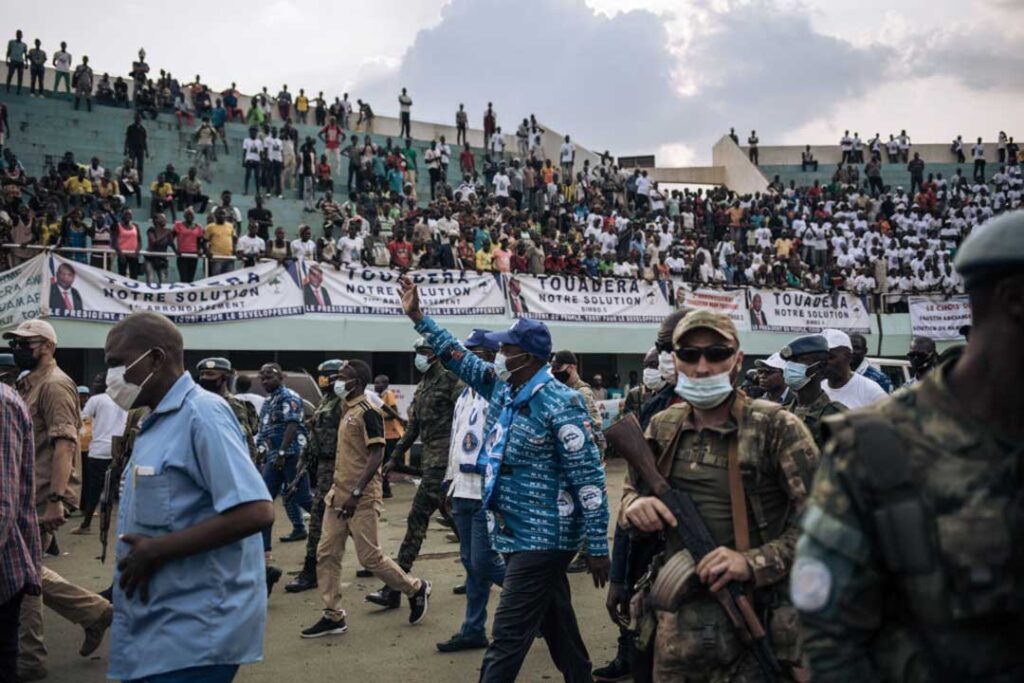ADF STAFF
The increasing presence of Russia’s Wagner Group in Africa underlined the Kremlin’s continued efforts to exert its influence on the continent in 2021.
The shadowy group of private military contractors garnered international headlines — and triggered global backlash — in September when Mali’s transitional military government sought a deal that would bring 1,000 of the Russian fighters and military instructors to the country at a cost of $10.8 million a month. The Russian government denies ties to the group.
Observers were uneasy over the development, noting that Wagner has left a trail of instability across the continent.
“We already know how this going to go [in Mali],” Joseph Siegle, director of research at the Africa Center for Strategic Studies, told Foreign Policy magazine. “They’ve gained unprecedented influence [in the Central African Republic (CAR)], and ultimately, Wagner has been implicated in human rights abuses, extrajudicial killings, rape and torture.”
Siegle added that the group likely will access gold, uranium and bauxite mines in Mali if the deal is signed.
Wagner mercenaries have been deployed in the CAR since 2017. The Russian fighters now serve as bodyguards to CAR President Faustin-Archange Touadéra, and Valery Zakharov, a former Russian military intelligence official, is Touadéra’s security advisor.
Wagner’s presence in the CAR has been marked by heavy-handed tactics, indiscriminate violence, and a lack of linguistic and cultural awareness. These factors have combined to increase opposition to the government and the mercenaries instead of reducing it.
“We thought they came here to restore peace to our country. Now I wish they’d never come,” a woman named Fatima told the Financial Times. Fatima said her village celebrated when Russian forces drove rebels away. But then they took her brother and raped her repeatedly at a military base, she said.
In Libya, the group broke the nation’s fragile cease-fire when its forces flew military aircraft over the city of Sirte in April, according to The Libya Observer. The flyover was another action by Wagner fighters to undermine attempts to resolve Libya’s divisions. It violated the cease-fire negotiated by the 5+5 Joint Military Commission representing the internationally recognized former Government of National Accord based in Tripoli and its opponents based in Tobruk.
Wagner fighters are loyal to Khalifa Haftar, the general who attempted a coup in 2014 and tried to take over Tripoli in 2019. As Wagner fighters retreated from the outskirts of Tripoli in late 2020, they planted land mines in civilian neighborhoods.
In Sudan, where Gen. Abdel Fattah al-Burhan took control of the government in a military coup in October 2021, there are growing informal ties between Wagner and Sudan’s Rapid Support Forces. Russia, which is negotiating a naval base agreement in Sudan, also has led an information campaign — resulting in three Facebook takedown actions — intended to create doubt among young Sudanese of the effectiveness of civilian rule, according to a report by the Atlantic Council.
The group has been active in Sudan since former President Omar al-Bashir invited it to train the nation’s military in 2017. Wagner-related mining companies came afterward and gained access to valuable gold mines as part of the deal. Now, observers believe, Russia wants the Sudanese military to keep power so it can continue to have access to the country’s natural resources.
“Most members of the international community support a democratic transition in Sudan, but a few have broken with the consensus. Russia has emerged as one of the Sudanese military’s boldest enablers,” wrote Mattia Caniglia of the European Council on Foreign Relations.
Wagner mercenaries also have reportedly been deployed in Angola, Guinea, Guinea-Bissau, Madagascar and Zimbabwe, according to a Bloomberg story published in May.
In December, the European Union imposed sanctions on the Wagner Group, accusing it of committing human rights abuses, including torture and unauthorized executions, and conducting clandestine operations on Russia’s behalf, Al-Jazeera reported. The sanctions, including travel bans and asset freezes, are meant to limit governments from working with the group.

